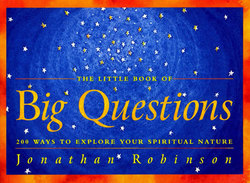Читать книгу The Little Book of Big Questions - Jonathan Robinson - Страница 12
На сайте Литреса книга снята с продажи.
ОглавлениеThe past does not have to equal the future.
—Anthony Robbins
When someone goes to a psychotherapist to make changes in their life, the sessions frequently begin with an exploration of their past. By understanding the past, one can better face the present with an increased level of wisdom. In the same way, as we review our unique spiritual past, we are better able to heal our “spiritual wounds” and face the future with more understanding.
To a large extent, you and I are a product of our childhood conditioning, yet when we see something in ourselves that we don't like, it's easy to feel guilty and ashamed. Likewise, when other people do things that annoy us, our compassion and tolerance can go right out the window. Exploring childhood roots of behavior can bring about an increased level of compassion. It becomes clearer why we behave the way we do and why others behave the way they do. As we become more aware of our conditioning, it's easier to break free of our limiting judgments and beliefs.
The questions that follow are for helping you to understand your unique spiritual history. As with all the questions in this book, you may wish to have a friend ask you the questions rather than simply answer them to yourself. Telling a friend about your childhood spiritual memories is tantamount to “spiritual psychotherapy.” In some cases, answering these questions could bring up strong feelings, memories, and insights. Be willing to take the time you need to assimilate whatever thoughts or revelations arise.
1. What was the very first notion of God you remember having as a child?
2. What did your parents directly or indirectly influence you to believe about God?
3. what religion, if any, do you identify with the most? Why?
When I was about seven years old, I became intensely afraid of dying. I would lie awake and think about how I might die during the night and then be gone for all of eternity. Once I could take it no longer, I told my mom about my fears. My mother had always been skeptical about God, but at that moment I needed something to believe in. As I sobbed my fears to her, she compassionately explained that there was a prayer I could say to God that would help. The prayertwas: “Now I lay me down to sleep, I pray to God my soul to keep. If I die before I wake, I pray to God my soul to take.” That was the first prayer I ever said. And my prayer was answered in that my fears of dying disappeared. To this day, I pinpoint that moment with my “nonspiritual” mother as the beginning of my spiritual quest. Thanks, Mom.
4. Did you pray as a child? Why or why not?
5. How are your spiritual beliefs similar to those of your parents?
6. How are your spiritual beliefs different from those of your parents?
7. How is your relationship with God similar to the relationship you had with your parents when you were young?
8. What was the most negative experience you can remember as a child that affected how you view religion or spirituality?
9. What was the most positive experience you can remember as a child that affected how you view religion or spirituality?
10. Were you required to go to a religious school of some kind? If so, how did that impact how you felt about God and religion?
11. As a child, what were you led to believe would happen to you after you died?
One day when playing baseball with a bunch of friends, I hit my head on the ground when diving for a fly ball. Soon thereafter, I couldn't remember anything about who I was, where I was, or even my own name. Physically, I felt fine; I just didn't know anything about myself. As friends escorted me to the doctor's office, I asked them questions about myself. Because I felt no attachment to the person known as Jonathan, I asked very personal questions, such as: What am I normally like to be around? and, What are my strengths? What do you see as my weaknesses? It was fascinating to hear my friends answer these questions so honestly. Since I didn't identify (at the time) with being Jonathan, I was able to listen fully to what my friends had to say. Their feedback was extremely helpful in getting an accurate picture of myself from the viewpoint of others. Perhaps you can ask a trusted friend the same questions.
12. What would you say are your spiritual weaknesses?
13. What have you considered to be your spiritual strengths?
14. As a child, what were you led to believe about other religions?
15. In your family and religion, what were you taught was God's way of viewing you when you “sinned” or did something “wrong”?
16. How has what you were led to believe about God when you were a child affected your relationship with God today?
